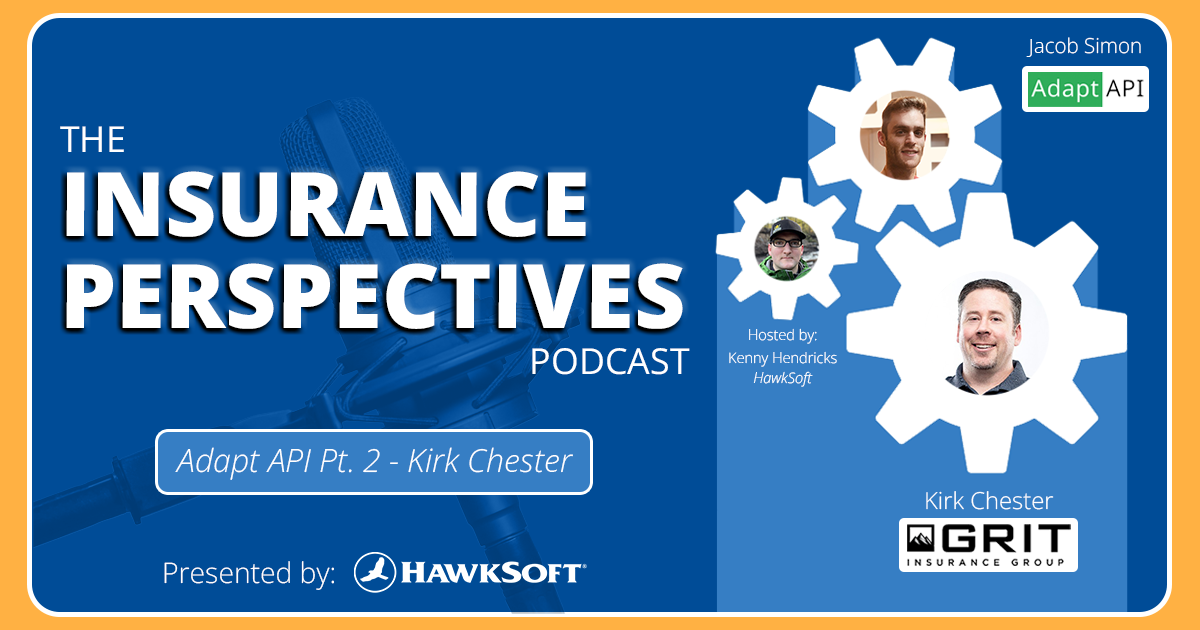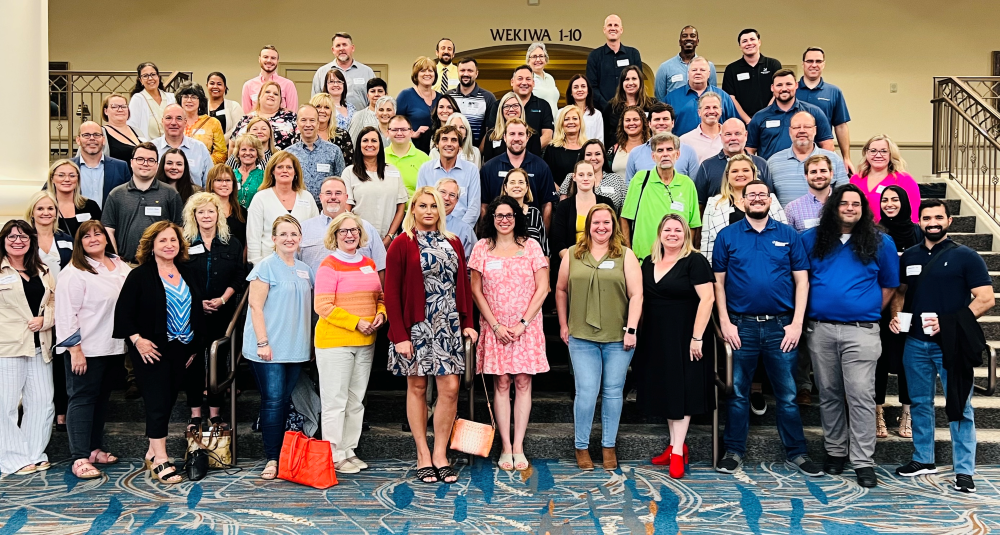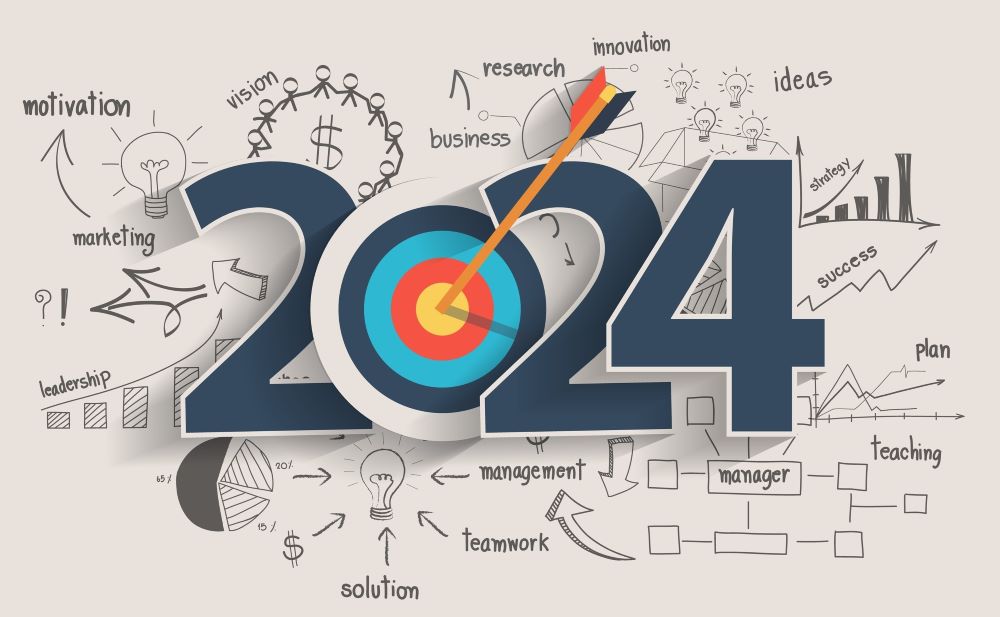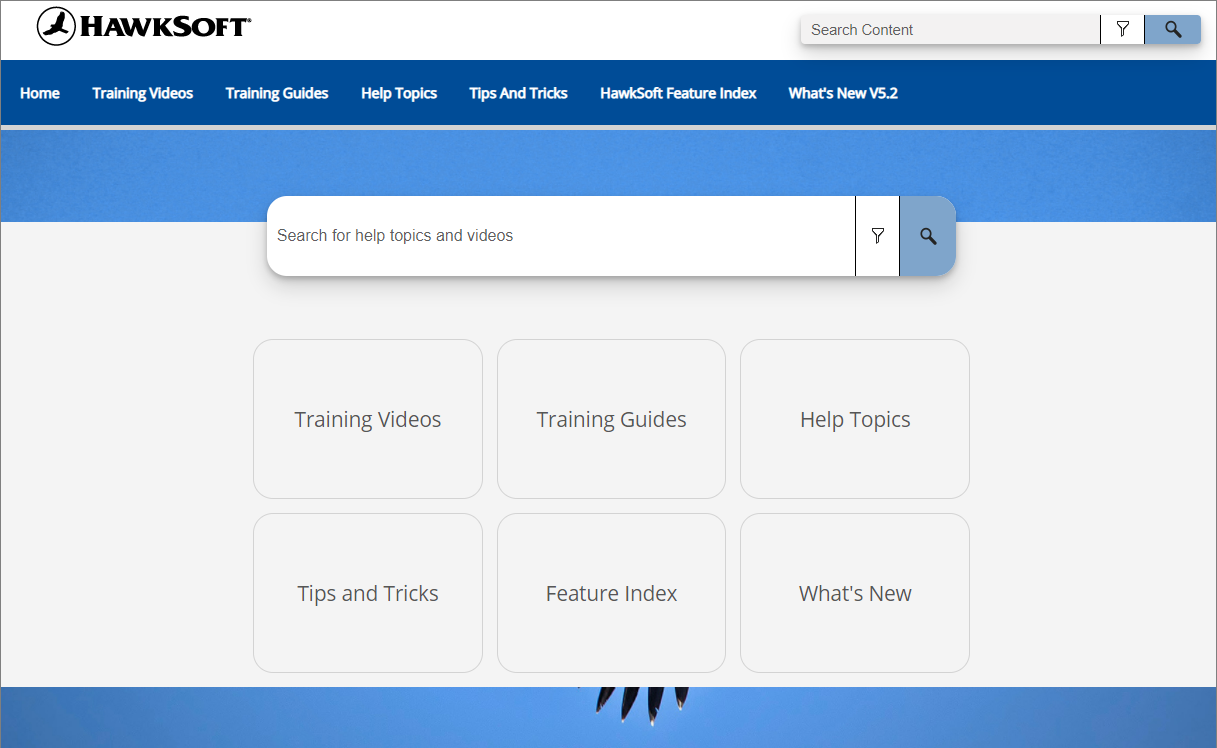The Insurance Perspectives Podcast involves contributors outside of HawkSoft. The participants' views are entirely their own and may not reflect the views of HawkSoft.
This recap of the Insurance Perspectives Podcast summarizes highlights of the two episodes about Adapt API, where HawkSoft host Kenny Hendricks interviews Jacob Simon of Archway and Kirk Chester of GRIT Insurance Group, an agency who uses Adapt API solutions.
Jacob and Kirk discuss how the automation, standardization, and consolidation of policy data across carriers can create significant time savings for independent agencies.
Listen to the Insurance Perspectives Podcast every Tuesday!Find the podcast on these podcast platforms: |
In this article:
- Part 1: Adapt API (Jacob Simon)
- What is Adapt API's reason for participating in the independent agency channel?
- What one aspect of Adapt API draws agencies in and keeps them working with you?
- How does Adapt API approach data ownership & security with regards to your customers?
- What is the hardest part of working with insurance agencies?
- What is the best part of working with insurance agencies?
- How does Adapt API work with HawkSoft?
- Part 2: GRIT Insurance Group (Kirk Chester)
- Tell us about your agency
- What was your agency looking for when you first encountered Adapt API?
- What is your agency able to do now with Adapt API that you couldn't do before?
- What is one thing you would change about Adapt API if you could?
- How would you describe the value that Adapt API brings to your agency?
Part 1: Adapt API (Jacob Simon)
Watch the video podcast - Part 1
Question 1: Why does Adapt API exist? What is your reason for participating in the independent agency channel?
- Host Kenny Hendricks introduces Jacob Simon, the founder and CEO of Adapt API.
- Jacob explains Adapt as a connectivity solution between carriers and agencies. There are many items that aren’t updated automatically on a policy via download, which causes manual work for the agency. Adapt allows for connectivity of more data so these tasks can be automated and cause less repetitive data entry for agents.
- Jacob started Adapt to solve common pain points he was hearing in talking to agencies and looking for areas where there were opportunities for technology to improve efficiency. He found one of the most common problems for agencies was getting policy data to transfer between systems, such as the carrier to the AMS to the CRM. This often caused double or triple data entry for agencies.
“Something that kept coming up was this problem of getting information between different systems. And I saw double entry, triple entry, sometimes quadruple entry of data. And so that's where I started to see not just this big, big problem, but also how we could solve it with our technology background.”
Question 2: If you had to pick one aspect of Adapt API that draws in and keeps agencies working with you, what would that be and why?
- Jacob mentions that customers appreciate Adapt’s focus on solving problems in a way that requires minimal effort for the user.
- He uses the example of Adapt’s late-pay workflow, which is historically arduous for agencies, requiring them to generate and cross-reference reports in several different places, reach out to the clients, and document it in the AMS or CRM.
- Adapt’s late-pay workflow automatically collects and standardizes the needed data, documents it in HawkSoft, and assigns a task to notify the correct person of a pending cancellation. It can even send this data to integration partners to automatically text, email, or leave a voicemail for the client.
- Adapt API workflows can be set up quickly in as little as 30 minutes upfront, and then the process runs automatically, saving a significant amount of time for staff.
- Kirk Chester mentions that as one of the earliest customers of Adapt, his agency was the one to ask for help with pending cancellation notices, which don’t download and were an arduous process for his agency.
- With Kirk’s agency receiving 10-15 pending cancellations from 10 different carriers per day, he estimates Adapt’s pending cancellations workflow saves his agency 10-15 hours of work per week.
“Pending cancellations are one of the few things that actually doesn't download. And so [Adapt’s workflow] is a huge time saver for us. Instead of trying to go in manually to each website, that report's aggregated in their inbox before they start their day.”
Kirk Chester
Question 3: How does Adapt API approach data ownership and data security with regards to your customers?
- Jacob emphasizes that Adapt has a similar approach to data ownership as HawkSoft, which is that an agency’s data belongs to the agency.
- Adapt strives to make it clear in their contract that data ownership remains in the hands of the agency, because they realize how important this is to their customers.
“The data belongs to the agency. We process on their behalf, we use it to provide value to the agency. But at the end of the day, it is their data. We're not selling it out the back door. And that's very clear in our contracts.”
Question 4: What is the hardest part of working with insurance agencies?
- Jacob observes that agencies often have a healthy skepticism of technology, as many have tried software tools that over-promise and under-deliver.
- He mentions that it can be difficult to demonstrate the value of Adapt’s product until agencies try it for themselves and see how much time it saves them.
- It can also be difficult for Adapt to serve a wide variety of agencies, as every independent agency has different processes and needs, so standardizing a solution that works for all customers isn’t always an option.
- Kirk adds that while he considers his agency as ahead of the technology curve, he knows many agency owners who struggle to adapt to changing technology and aren’t open to changing the software and processes they have in place, even if it could benefit them.
- Jacob agrees that it can be hard for agencies to understand how much easier their workflows can be until they make the change and see the difference.
- Kirk emphasizes that Adapt has helped his agency maximize their human capital, allowing each of his staff to handle a greater number of clients.
- Jacob adds that automating workflows also helps increase job satisfaction for staff, as they can do less administrative work and focus on more meaningful tasks. Technology can also help entice younger generations to work at an agency.
“It's hard for people to know what's possible when they haven't seen it. If they've done the same thing for ten years or 20 years, they haven't seen that function improvement, so it's hard to even conceptualize. We're still trying to figure out how to communicate that and build that trust so people know that there is a much better possibility available.”
Question 5: What is the best part of working with insurance agencies?
- Jacob loves how close-knit the independent agent community is, and notes that it’s rare to see businesses be so willing to share knowledge and help each other succeed with no expectation of receiving something in return. He gives the example of Kirk being willing to take the time to record this podcast simply to help other agencies learn from his experiences.
- Kirk agrees that independent agents often don’t see each other as competitors, even going so far as to send referrals to each other when a client is a better fit for another agency.
- Kenny agrees that HawkSoft has the same kind of mentality, where the sales team is happy to recommend a different system to an agency if it will be a better fit for them. He appreciates that the industry focuses on helping everyone succeed together.
“In most other industries, you don't see people helping each other so much out of the goodness of their hearts. They're not getting any benefit from it. They're just like, I found this thing that works well for me. Let me tell you all about it. And I just think that's so cool because it's actually pretty rare to have that kind of community.”
Question 6: How does Adapt API work with the HawkSoft management system?
- Jacob explains that Adapt is able to pull data and files (such as PDFs) that don’t come in through policy downloads, and match them up to the correct policy in HawkSoft, as well as create any needed tasks for staff to review or take action.
- This prevents staff from needing to go to individual carrier sites to collect information, then enter it back into their management system before taking action on it.
- Adapt can bring in data on renewals, endorsements, late payments, claim notifications, and more. Jacob mentions it’s particularly useful in the commercial space, where there can be a lot of information that comes in outside of downloads.
- Adapt enables agencies to provide a level of outreach that wasn’t previously possible to do on an individual basis, such as claims outreach, by automatically collecting needed info across different carriers and sending out messages at the right time.
“We have some agencies doing automatic claims outreach [through Adapt]. There are a lot of these things that previously didn't make sense that we can enable through our integration with HawkSoft.”
Part 2: GRIT Insurance Group (Kirk Chester)
Watch the video podcast - Part 2
In this episode:
- Tell us about your agency
- What was your agency looking for when you first encountered Adapt API?
- What is your agency able to do now with Adapt API that you couldn't do before?
- What is one thing you would change about Adapt API if you could?
- How would you describe the value that Adapt API brings to your agency?
Question 1: Tell us about your agency. How long have you been in the business, and how did you get into the business? Do you have any specializations? What gets you excited about insurance?
- Kenny introduces Kirk Chester, the founder and agency principal of GRIT Insurance Group. Kirk has over 20 years of experience in the insurance industry, having started as a captive agent before transitioning to being an independent agent.
- Kirk explains that GRIT stands for generosity, respect, integrity, and trustworthiness in working with clients. In his mind, grit means the ability to focus on a goal even without visible progress for as long as needed, while maintaining a positive attitude.
- Because Kirk had several experiences at different agencies before forming GRIT, he had a chance to form a strong vision for what he wanted at his own agency.
- GRIT was formed in 2017 and now has 6 employees, including two in the Utah office, three in their remote office in Idaho, and one virtual assistant overseas.
- The agency has a fairly even split between personal and commercial lines, with a focus on six niches he calls “blue-collar brokers,” including contractors, farm, distribution, manufacturing, real estate, and land development. Kirk grew up in rural Idaho, and enjoys serving rural communities.
“GRIT stands for generosity, respect, integrity, and trustworthiness interfacing. We have to be goal-oriented, responsible, innovative, and tenacious in finding solutions for our clients.”
Question 2: What was your agency looking for when you first encountered Adapt API?
- Kirk admits that running into Adapt at a HawkSoft conference was a coincidence, but that his agency was immediately intrigued by the possibility of having Adapt create consolidated reports for areas like billing, cancellations, or endorsements, which could save his agency hours every week.
- Kirk mentions his agency is always willing to invest in technology that will help his lean staff be more productive.
- Kirk appreciated that Jacob listened to his agency’s needs during their initial conversation, and quickly built a custom solution in less than a week. While Kirk’s staff has had bad experiences with implementing new technology in the past, they immediately saw the benefit and time savings with Adapt.
“Jacob was willing to listen to the needs that we had, the pain points and the technology gap. Pending cancellation reports started feeding into our spreadsheet. Our person who was making those outbound calls said, this is a godsend. I don’t have to look up 14 different carriers to figure out how to get this taken care of.”
Question 3: What is your agency able to do now with Adapt API that you couldn't do before?
- Kirk likes that the agency is now automatically prompted to complete tasks like pending cancellations, rather than having to go to several places to get the information he needs. This helps hold his team accountable to the level of service the agency wants to provide.
- He mentions that in future, he’d like to automate even more of the process so that instead of assigning a task to have an employee contact a customer, Adapt automatically triggers an email, text message, or voicemail to send.
- Adapt allows GRIT to keep a high level of service with each client, even as the agency grows.
- Jacob adds that the cost savings for agencies (in terms of time saved for staff) far outweighs the cost of Adapt’s solution. Kirk agrees that even a small increase in retention can have a huge impact on an agency’s bottom line.
- Kirk points out that standardizing and automating data entry not only offloads unwanted tasks, but is also more accurate than manual data entry.
“If you bump an agency's retention one or two points...that lifetime value of a client is dramatic. We have the ability to do that on an automated basis and get employee retention up three or four points.”
Question 4: What is one thing that you would change about Adapt API if you could?
- Kirk mentions that on his wish list would be the ability to get Adapt’s data directly into multiple different databases. Right now, the data goes into his CMS (HawkSoft), and is pushed to his CRM from there, rather than going directly to his CRM.
- Kirk is excited about AI opening more possibilities in the future, such as automatically generating voicemails customized to a client’s specific information.
- Kenny notes that while the best solutions appear very simple, which can prompt users to think they are quick to iterate on and add features to, they typically require a vast amount of unseen programming work in the background.
“That's where I think the magic really starts to happen with automation. You start to get AI involved by automatically dropping text messages, emails, voicemail with carrier billing, account number, phone numbers they can call to make the payment, and how much is due.”
Question 5: How would you describe the value that Adapt API brings to your agency?
- Kirk loves the transparency that Adapt’s consolidated reports provides his agency by letting them know which customers need urgent attention. Before, that information was buried and required employees to proactively gather it from every carrier.
- Adapt makes it easier for GRIT’s staff to start their to-do list and complete arduous tasks in far less time.
- Kirk appreciates how accessible and responsive both Adapt and HawkSoft are to his agency. He feels his needs are heard and his problems are quickly identified and solved.
“The best part about it is that Jacob is accessible, just like you guys [HawkSoft] are. When you reach out to HawkSoft for a conversation or a question, there's somebody there that cares enough to listen. That's probably the best thing I could say about any technology partners. If they're not willing to hear you, you're not going to get anything done.”
Automate the busy work out of policy servicing with Adapt APIGet policy notices and carrier documents consolidated in one place, across all your carriers. Agencies see 5-10x ROI on processes. |







